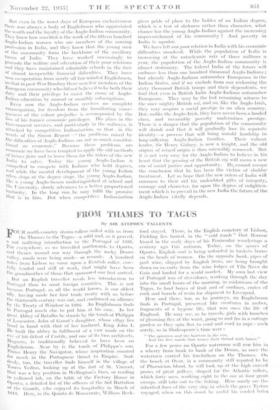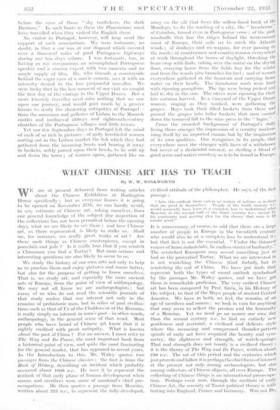FROM THAMES TO TAGUS
By SIR STEPHEN TALLENTS OL,R north-country steam-rollers sailed with us from the Thames to the Tagus—a solid and, as it proved, a. not unfitting introduction to the Portugal of 1935. 1.'or everywhere, as we travelled northwards to Oporto, :mid thence wound our was,' through the rocky Douro "dley, roads were being made---or remade. A hundred Hiniles from Lisbon we came upon a Kentish roller, earc- ,ri'lly tended and still at work, that might have been the grandmother of those that sponsored our first arrival, But an -English traveller heeds. less introduction to Portugal than to most foreign countries. This is not because Portugal, as all. the world knows, is our oldest uilY. having made her first trade treaty with. us before the thirteenth century was out, and.confirmed an alliance bY time Treaty of Windsor in 1380. An Englishman finds im Portugal much else to put him at his ease.. In..her great Abbey of I3atallia lie stands by the tomb of Philippa ')f Lancaster, John of Gaunt's daughter, whose effigy lies hand in hand with that of her husband, King John 1. Ile built the 'abbey in fulfilment of a vow made on the eve of hi§ defeat of Castile, and one of its two architects; huguete, is traditionally believed to have been an Englishman. .Near • by is the tomb of Philippa's soli, Prince Henry the Navigator, whose inspiration counted for much in the 'Portuguese thrust to Empire.. Sud- ,,,aenly, too, the traveller finds himself in the village of Torres Vedras, looking., up at the fort of St. Vincent, that was a key position in Wellington's lines, or reading Ill yellowed. ink, on the table of the Factory House in Pporto,.a detailed list of the officers of the 3rd Battalion. of the Guards, who enjoyed its hospitality in March of 1813, Here, in the Quinta de Monserrate, William l3eck-_ ford stayed. There, in the English cemetery at Lisbon, Fielding lies buried, in the " cold- tomb " that 'Borrow kissed in the early days of his Peninsular wanderings a eentiwy ago this autumn. Today, on the quays of Oporto, English coal is being unloaded in baskets borne on I he •heads of women. On the opposite bank, pipes of port wine, shipped by English firms, are being brought down on ox-carts from the wine lodges of Vila Nova de Gain, and loaded for a world market. My own last view of Portugal was of stevedores, working through the day into the small hours of the morning, in midstream of the Tagus, to load boxes of fruit and of sardines, orates of cork and barrels of resin for shipment to Liverpool.
• Here and there, too, as he journeys, an Englishman finds in Portugal, preserved like creatures in amber; fragments of a bygone life, that was once the life of England. He may see, as he travels, girls with bunches of gleaming flax at. the waist, going to and fro in a cottage garden as they spin flax to cord and cord to rope—such surely, as in Shakespeare's time were : " The spinstem and the knitters in the sun, And the free maids that weave their thread with bones.".
• For a few pence an Oporto waterman will row him in a wherry from bank to bank of the Douro, as once the watermen carried his forefathers on the Thames. On the beach at Ovar, in a community still reputed to be of Phoenician blood, he will look up at the high curved. prows of great galleys, shaped. for the Atlantic rollers, which forty men, working eight to the oar at. four great, ;--;weeps, stilt takeout to the fishing. • Here surely are the inherited lilies of the -very ship iti which the grave Tyrhnt- Voyaged; when on this coast he undid his corded bales before the eyes of those " shy traffickers, the dark Iberians." In such boats as these the. Plidenicians must have t ravelled when they visited the English shore.
No visitor to Portugal, however, will long need the support of such associations. We were fortunate, no doubt, in that a car was at our disposal which covered over a thousand miles of good Portuguese highways during our tell days ashore. I was fortunate, too, in having as my companions an accomplished Portuguese speaker and a cinema expert with two cameras and an ample supply of film. He, who threads a countryside behind the eager eyes of a movie camera, sees it with an intensity denied, to the less purposeful traveller. We were lucky that in the last moment of our visit we caught the first day of the vintage in the Upper Douro. But a more leisurely traveller need miss nothing that we saw upon our journey, and would gain much by a greater leisure to study the clustering antiquities of Portugal— from the museums and galleries of Lisbon to the Moorish castles and mediaeval abbeys and eighteenth-century churches of the Portuguese villages and little towns.
Yet our few September days in Portugal left the mind of each of us rich in pictures--of gaily kerchiefed women sorting out in the Lisbon market the fish which they had gathered from the incoming boats and hearing it away in baskets, nobly poised upon their heads, to be sold up and down the town ; of women again, gathered like an army on the silt that faces the willow-lined bank of Mondego, to do the washing of a city, the " IavadeiraV of Coimbra, famed even in Portuguese verse ; of the pink windmills that line the ridges behind the westernmost coast of Europe, their sails set to catch the Atlantic winds ; of donkeys and ox-wagons, for ever passing oir the roads; of countrymen and countrywomen everywhere at work throughout the hours of daylight, threshing the bean crop with flails, raking over the maize on the drying floor, carrying home from the fields hay for the winter and from the woods pine branches for fuel ; and of women everywhere gathered at the fountain and carrying home water on their heads. The farmhouse roofs were lined with ripening pumpkins. The figs were being picked and laid to dry in the sun. The olives were ripening for their late autumn harvest. In a vineyard of the Upper Douro women, singing . as they worked, were gathering the grapes. Boys took their filled baskets from them and poured the grapes into taller baskets that men carried down the terraced hill to the wine press in the " lagar." From the crowded background of Portugal's daily living there emerges the impression of a country modern- ising itself by no imported canons but by the inspiration of its own qualities. One recognises in its people, that everywhere meet the stranger with faces of a withdrawn but never of a disdainful interest, as sterling a 'blend of good sense and native courtesy as is to be found in Europe.































































































 Previous page
Previous page